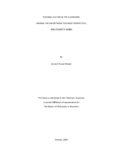Please use this identifier to cite or link to this item:
https://elibrary.tucl.edu.np/handle/123456789/1322| Title: | Teaching Culture in the Classroom: Binding the Gap Between Teachers' Perspectives and Students’ Needs |
| Authors: | Dhakal , Ganesh Prasad |
| Keywords: | teaching;learning;perception |
| Issue Date: | 2009 |
| Level: | M.Phil. |
| Abstract: | In the present context of Nepal, a number of governmental, non-governmental and private organizations have taken a nationwide initiation to provide children with the quality education. To accomplish this objective, the programs like EFA, SESP, TEP, food for education program, Japanese grant for the development of school physical facilities have been executed with the active involvement and contribution of these organizations. These programs have mainly contributed to creating enabling environment in Nepalese schools through monitory support, development of physical infrastructure and capacity building of human resources. Despite these initiatives, the existing performance level of public school students is relatively low as compared to that of private school students. Hence, it is in this context that the present research has aimed to examine and explore the present scenario of the classroom environment, which is one of the responsible factors for overall students’ performance. This study made an attempt to undertake four objectives such as to explore actual teaching learning culture, pedagogical processes, stakeholders’ perceptions and problems faced by them, and finally to suggest some solutions in overcoming these problems. In pursuit of these objectives, the findings of the study were explored from detailed and systematic observation of different aspects of classroom culture in respect of teaching and learning activities, and from expressions and experiences of different stakeholders. Similarly, field information has been analyzed in terms of different theories, principles and the concepts available in different literatures. The research tools adopted in the present work are basically open observations of the classrooms and an in-depth interview with the stakeholders. The information about classroom teaching culture and stakeholders’ perceptions in relation to democracy, equity, child friendly and learner centered classroom activities were also compiled and analyzed. To analyze information, data were grouped into different main headings and sub headings. In this process I have analyzed information keeping the literature in view and linking them to different theories. In the same way, the data from the field were triangulated for its validation. Most of the teachers were found to carry remarkably structured, traditionally routed, cultured and power centric characteristics in the actual classroom activities. The major lacking on the part of teachers in the actual classroom situation is that they were not able to contextualize and generate knowledge when they involved students in teaching learning activities. Furthermore, they were not enthusiastic enough to make maximum utilization of their knowledge by using resources available. They mostly treated all individual students equally instead of identifying and addressing their personal needs. They did not understand themselves as a supporter of students, and presented themselves as an authoritarian in the classroom. It is interesting to note that teacher as a powerful authoritarian employed the same traditional model of transmitting knowledge to students. The present work revealed that teachers did not produce new ideas with the active involvement of students in the classroom so that they create an environment in which they can actualize students’ potentials. Thus, the present classroom practices driven by such a trend of teachers fail to solve the students’ needs. Eventually, facts and information elicited from the observations did not agree consistently with the perceptions and expressions of stakeholders. However, the opinions of the stakeholders were found consistently similar. The present scenario after all showed in general that the classroom culture could not address the children’s needs. |
| URI: | http://elibrary.tucl.edu.np/handle/123456789/1322 |
| Appears in Collections: | English Language Education |
Files in This Item:
| File | Description | Size | Format | |
|---|---|---|---|---|
| Thesis.pdf | 948.48 kB | Adobe PDF |  View/Open |
Items in DSpace are protected by copyright, with all rights reserved, unless otherwise indicated.
